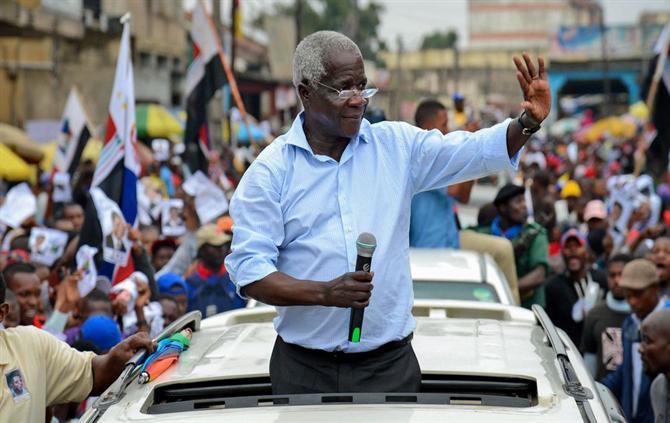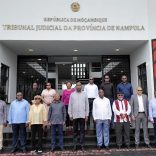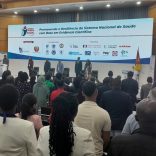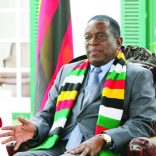President Chapo calls for new phase of reciprocal cooperation between Mozambique and Portugal
Chronology: Main dates in the life of Renamo leader Afonso Dhlakama

Afonso Dhlakama former Renamo leader (Lusa)
Afonso Dhlakama, who died yesterday in Mozambique at age 65, was the perennial defeated candidate in the five multi-party presidential elections in Mozambique.
In 2019, the pluralist Mozambican presidential elections, begun in 1994, will for the first time in 25 years no longer have the leader of the Mozambican National Resistance (Renamo) as a candidate.

The main dates in Dhlakama’s life are as follows:
– January 1, 1953 – Birth of Afonso Macacho Marceta Dhlakama, in Mangunde, Chibabava district, Sofala, the son of a traditional leader, chief [Régulo] Mangunde.
– September 25, 1964 – Beginning of colonial war/independence struggle in Mozambique.
– September 8, 1974 – End of colonial war/liberation struggle in Mozambique.
– 1974 – At the age of 21, Dhlakama joins the Mozambican Liberation Front (Frelimo), a movement that fought for the independence of the country, to which it would accede to June 25, 1975.
– End of 1974 – Leaves Frelimo. In 2015, in an interview with the Lusa news agency, Dhlakama argued that civil war in Mozambique was justified by Frelimo’s “betrayal of independence”, and, had it not been “arrogant” and “cruel”, the movement he [Dhlakama] founded would not have existed. For Dhlakama, were it not for the “arrogance” of Samora Machel, the first Mozambican president, and Frelimo’s “cruel behaviour”, “there would be no physical force for a civil war”.
– June 25, 1975 – Independence of Mozambique – Frelimo takes over the country in a single-party framework.
– 1976 – Joined a Frelimo dissident group led by André Matsangaíssa, another dissident.
– Beginning of 1977 – Creation of the Mozambican National Resistance (Renamo). Rebel movement led by André Matsangaíssa of which Afonso Dhlakama was one of the cofounders. According to Jaime Nogueira Pinto in the book ‘African Games’ [‘Jogos Africanos’], Renamo is born of a set of reasons, circumstances, wishes, feelings and resentments. “It is born of the new regional geopolitical conjuncture, with UDI’s Rhodesia (now Zimbabwe) desirous of carrying out reprisals and of counterbalancing sanctuaries and support for ZANU-PF in Mozambican territory. It also arises from the discontent of a substantial part of the rural population, especially from the centre-north of the country, in relation to Frelimo’s socialist policies and its mode of execution. It is also the result of resistance to persecution against the former Mozambican soldiers of the Portuguese army, especially the GE (Special Groups) and the GEP (Special Parachute Groups), forced to hide and flee into the forests. And lastly it arises from the desire for retaliation and change from the settlers, who had meanwhile taken refuge in South Africa.”
– 1977 – Beginning of the Mozambican civil war between Renamo and Frelimo.
– November 17, 1979 – André Matsangaíssa dies, killed in combat during Renamo clashes with Frelimo forces.
– December 1979 – Afonso Dhlakama, 26, tentatively takes over the leadership of Renamo, a position he would definitely assume in the early 1980s.
– 1984 – “Non-aggression pact” signed by the governments of Mozambique and South Africa. The agreement provided for South Africans to stop supporting Renamo and for the Maputo authorities to prevent the establishment of African National Congress (ANC) bases in Mozambique.
– Late 1980s – Negotiations begin for a peace agreement between the Frelimo government and Renamo. Dhlakama agrees to lead the Renamo delegation in peace negotiations with the government, led by Joaquim Chissano, with talks on the demilitarisation of the rebel movement, the integration of its troops into the National Defence and Security Forces, the introduction of a multi-party system and the regular holding of elections.

– October 4, 1992 – End of the Mozambican civil war with the signing of the peace agreement in Rome, mediated by the Community of Sant’Egidio. Renamo moves from “rebel movement” to political party and Dhlakama from “rebel leader” to party leader.
– 1994 – First general elections – presidential and legislative – under a multi-party system in Mozambique. Dhlakama is defeated by Joaquim Chissano. The same would happen in the presidential elections of 1999 (again against Chissano), 2004 and 2009 (both against Armando Guebuza) and 2014 (against Filipe Nyusi).
– 2010 – Dhlakama leaves Maputo and settles in Nampula after refusing to acknowledge the results of the presidential elections of the previous year. He enters into a political dialogue with then President Guebuza, but without results. Maputo sends military and paramilitary forces to Nampula, prompting Dhlakama to move again, taking refuge in Renamo’s former headquarters in the village of Sathundjira, Vunduzi, Gorongosa district, Sofala province.
– 2013 – It is from Gorongosa that he begins to lead a new military confrontation against the governmental forces, begun with an attack to the police station of Muxungué. In response, regular forces attack his place of residence, but Dhlakama escapes unharmed.
– September 5, 2014 – End of the new military conflict, with the signing of a new peace agreement, which enabled Dhlakama’s participation in the 2014 presidential elections, in which he would once again be defeated, this time to the current head of the Mozambican state, Filipe Nyusi.
– February 2015 – Meetings and political talks between Nyusi and Dhlakama, with no practical results.
– September 12, 2015 – The Renamo leader survives the first of three attempts on his life when his convoy was attacked in the province of Manica, apparently by men from the Mozambican defence and security forces, injuring five. Dhlakama comes out unscathed.
– September 25, 2015 – Second attempt, also in Manica. Dhlakama escapes unharmed again and takes refuge in the woods.
– October 8, 2015 – After negotiations with the government, Dhlakama agrees to leave the bush and take up residence in the city of Beira. The next morning, police surround his residence and disarm his bodyguard, an operation “framed” as the beginning of the “coercive disarmament of the armed Renamo men”. Days later, Dhlakama manages to escape from his residence in Beira, and again takes refuge again in the Gorongosa mountain range and resumes the military attacks. Further talks between Dhlakama and Nyusi follow. Truce is agreed and the end to hostilities announced.

– 2017 – Nyusi travels to Gorongosa three times for political meetings with Dhlakama.
– 2018 – Dhlakama and Nyusi agree on a decentralisation package, already delivered to the Assembly of the Republic, where it is currently awaiting approval. The two leaders were negotiating the demobilisation and integration of Renamo’s men into the Defence and Security Forces, with Dhlakama awaiting the end of the negotiations to again emerge from the bush.
– May 3, 2018 – Death of Dhlakama.
Mozambique: Dhlakama’s body arrived at the morgue of Beira Central Hospital at dawn today












Leave a Reply
Be the First to Comment!
You must be logged in to post a comment.
You must be logged in to post a comment.